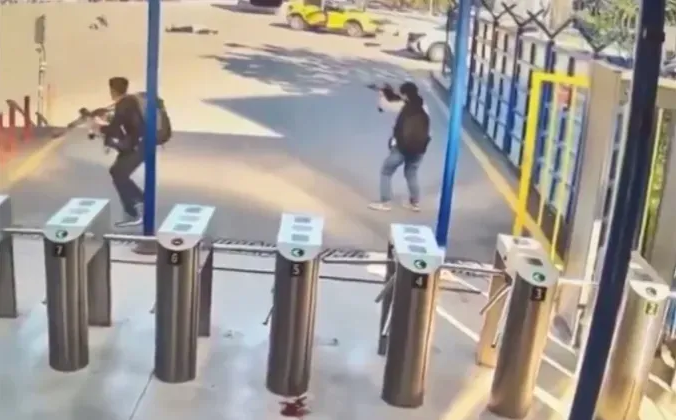Kurdish rebels killed 5 and injured 22 in an attack in Turkish capital Ankara, authorities have confirmed. The assault targeted the headquarters of Turkish Aerospace Industries (TAI), located approximately 40 kilometers outside Ankara. The attack, believed to be carried out by the Kurdish militant group PKK, resulted in a tragic loss of life and left numerous others injured.
The incident unfolded when two attackers, a man and a woman, launched an assault on TAI’s premises. Turkish Interior Minister Ali Yerlikaya confirmed that both attackers were “neutralized” during the operation. Although no group has officially claimed responsibility for the attack, Yerlikaya indicated that the PKK, a Kurdish rebel group banned in Turkey, the US, and the UK, is suspected to be behind the violence.
Details of the Attack
The attack began near the entrance of TAI, with videos showing the attackers firing guns in the vicinity. The explosion occurred at a time when staff at the company were changing shifts, adding to the chaos. Four of the victims were employees of TAI, while the fifth was a taxi driver who was killed when the attackers hijacked his vehicle to carry out the attack.
Among the 22 injured, seven were members of Turkey’s special operations forces, according to Interior Minister Yerlikaya. The blast caused widespread panic, and employees were quickly directed to shelters for safety.
TAI, a prominent player in Turkey’s aerospace and defense sector, plays a key role in manufacturing and modernizing military and commercial aircraft, including the licensed production of US-designed F-16 fighter jets for NATO. The attack occurred during a major defense trade fair being held in Istanbul, further intensifying the security concerns surrounding the incident.

Government Response and Condemnation
Turkish President Recep Tayyip Erdoğan, who was in Russia attending the BRICS summit, condemned the attack, calling it a “vile terror attack.” In remarks made during his meeting with Russian President Vladimir Putin, Erdoğan emphasized that Turkey’s security forces acted swiftly to neutralize the attackers and prevent further damage.
“No terrorist organization, no evil focus targeting our security will be able to achieve their goals,” Erdoğan stated in a post on X (formerly Twitter), reaffirming Turkey’s resolve against terrorism.
In response to the attack, Turkish authorities imposed a media blackout, restricting the release of details about the incident. Major social media platforms, including YouTube, Instagram, Facebook, and X, were also reportedly blocked across large parts of Turkey to prevent the spread of images and videos from the attack. The president of Turkey’s Radio and TV Supreme Council, Ebubekir Sahin, urged citizens not to share any media that might serve the interests of terrorism.
Retaliatory Airstrikes
Following the attack in Ankara, Turkey’s defense ministry launched retaliatory airstrikes on Kurdish rebel targets in northern Iraq and Syria. The PKK, which has waged a decades-long insurgency against the Turkish state, operates from bases in these regions. The group has been seeking greater autonomy and rights for the Kurdish minority in Turkey since the 1980s. The conflict between Turkey and the PKK has led to thousands of deaths over the years, and the recent attack is seen as a continuation of this ongoing struggle.
Broader Implications
The attack in Ankara highlights the ongoing tensions between the Turkish government and Kurdish rebels, particularly the PKK. Despite the Turkish government’s efforts to clamp down on insurgent activity, the conflict continues to destabilize the country. The PKK remains a significant threat, carrying out attacks on military and civilian targets, often prompting military responses from Turkey.
The attack also raises concerns about security within Turkey’s defense sector, as TAI plays a crucial role in the country’s military capabilities. The assault on such a high-profile target during an international defense trade fair underscores the severity of the threat posed by militant groups like the PKK.
Conclusion
Kurdish rebels killed 5 and injured 22 in an attack in Turkish capital Ankara, marking a tragic escalation in the ongoing conflict between the Turkish government and the PKK. As Turkey grapples with the aftermath of this violent incident, security forces have launched retaliatory strikes on PKK positions in neighboring regions. The attack highlights the persistent challenge posed by Kurdish insurgent groups and raises broader questions about security in Turkey’s critical defense and aerospace sectors.
Stay connected to know more on arcnews.online for global news like Kurdish Rebels Killed 5 and Injured 22 in an Attack in Turkish Capital Ankara. For videos updates visit our YouTube. Do subscribe to Arcnews to get latest updates directly in your mail box.
Have A Great Day.


